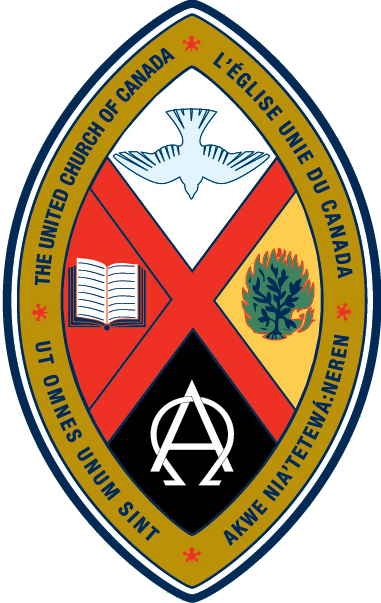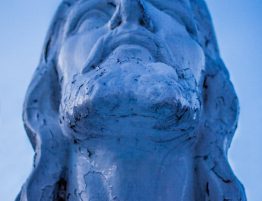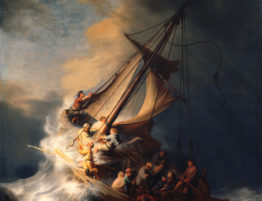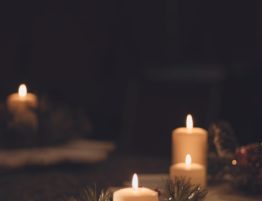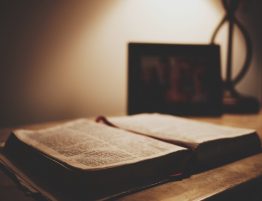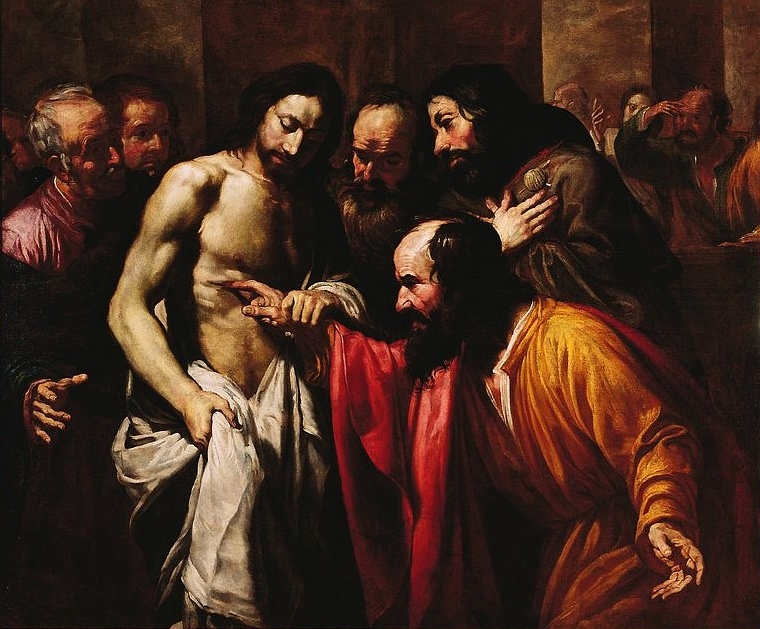
Sermon for Second of Easter, Year C preached at South Bay United Church by The Rev Phil Hobbs
Of Doubting & Believing
This is an interesting story isn’t it? The disciples are huddled together behind closed doors. They are huddled together in a locked room. Later that same day. Later on the day when the first reports reached them.
The first reports about the body missing from the garden tomb. The first reports of the stone rolled away. The first reports of visions of angels. The incredible, unbelievable reports that said that Jesus was alive. As though they didn’t know he was dead! As though they hadn’t watched from a distance as he died that horrible death on Friday afternoon.
And so they found themselves on Sunday evening: still numb from grief; seeking comfort in familiar things; huddled together in the room where they had last shared a meal with Jesus.
And it was to those same grief-stricken disciples that Jesus appeared. Suddenly he stood among them. How could it be? They were filled with wonder and with joy. They knew his voice. They knew his familiar words of peace. They knew his bodily presence – nail scarred hands – wounded side. Yet not all of them were present.
Thomas, also known as “The Twin” was not there. The story doesn’t tell us where he was. It probably doesn’t matter. We know that he wasn’t present. He did not see or hear Jesus. He had no experience of the risen Christ.
So it was that when the others told him: “We have seen the Lord.”, it seemed to him an idle tale. His experience was of Good Friday agony. His experience was of the despair of Easter Saturday. His experience was the guilt of having run, as they all had, to save their own skins.
Surely Thomas’ response is understandable. “Unless I see for myself the prints of the nails in his hands; unless I can touch the scars – and place my hand in the wound in his side – I will not believe.”
And for this act – for these words – Thomas has been forever dubbed “Doubting Thomas”. The expression even coming into our own English language to describe a person who is sceptical.
But wait. We would be well advised to consider for a moment whether this is a reasonable label? Who was this disciple? Where else do we hear of him in the Gospels?
Thomas, it turns out, like each of us, was no one-dimensional person. Thomas character can not fairly be summed up by this one moniker.
A few days before the events of Maundy Thursday, Good Friday and Easter – Jesus and his disciples were far away from Jerusalem, in their home province of Galilee. Word came to them that their friend Lazarus was ill. When the word came to Jesus and the disciples they waited. They delayed leaving Galilee. But after a couple of days Jesus indicated his intention to go to Bethany – on the edge of Jerusalem – to see his ailing friend.
The disciples were horrified. “Don’t you realize, Jesus, that people there are out to get you?” Surely Mary and Martha, Lazarus’ sisters know that? Forget it Jesus. Lets just stay put here where we know it is safe. So said they all. Well almost all. There was one who had a different opinion. That one was Thomas.
And what did Thomas say? What was the advice of this one who has been labelled “Doubter”? When Jesus could not be persuaded to take the advice of his disciples – and was determined to travel south to Bethany – it was Thomas who said to the reluctant disciples – the other 11 – “Let us all go with the Teacher, so that we may also die with him.” (That story can be found in Chapter 11 of the same Gospel of John that we read from this morning.)
Thomas does not sound much like a doubter here does he? And we know that tradition and legend hold that it was Thomas who was responsible for carrying the Gospel of Christ to the sub-continent of India.
But Jesus came to Thomas’ where he was. Jesus appeared a week later to these same disciples. They were still huddled together in a locked room. They were still uncertain. They still did not know what the future might hold for them. They were still filled with fear and foreboding.
Once again, Jesus encountered them. Jesus stood among them – even though the door was locked. This time Jesus spoke directly to Thomas: “Reach out and touch my hands. Place your hand in my wounded side. Don’t doubt — but believe!”
And in response to this invitation – in response to his own experience of the risen Christ – Thomas exclaimed: “My Lord and My God!” Thomas confessed his faith in the risen Christ. And incidentally, he is the first of the disciples to do so. Out of Thomas’ doubt – out of his struggle to honestly deal with his own misgivings – came a profound and powerful confession of faith.
Well, this is very interesting – but what does it have to do with us? What does this have to do with those of us who have not stood in a locked room with the risen Christ before us?
This story is important for us – for you and for me here on the Second Sunday of Easter in this year 2019 – because it speaks of doubting and believing. This story bears witness to the fact that Jesus comes to us where we are. In the places where we live. As we walk by the way. In the ordinary places of our lives. As we sit at table with friends and family. It is here that Jesus meets us. Here with these real flesh and blood sisters and brothers with whom we worship; with whom we walk; with whom we talk and laugh; with whom we sometimes fight!
It is even in the locked rooms of our lives – where we huddle in fear and doubt – that Jesus encounters us. He comes to us offering us peace and sending us out into the world by the power of the Holy Spirit, to be the Body of Christ.
For us, just as for Thomas, doubting and believing are two sides of the same coin. Doubting and believing are part of the journey to authentic faith.
When I was a theological student, way back in 1983, I did a year-long internship at South Arm United Church in Richmond, British Columbia – on the delta of the Frazer River, south of Vancouver. It was my distinct pleasure to get to know a number of the folk at South Arm as I served as their Associate Pastor. It was while I was there that Carol and I got to know a woman whom I’ll call Joan. We were invited into the home of Joan and her husband Bud. They warmly welcomed us and extended hospitality to Carol and myself and our little girls who were missing their Grandparents – thousands of miles away in Southern Ontario.
One day, Joan came to my office, and shared with me part of her story. She had been a small child during the Blitz in London, England during World War II. She was one of the million and a half children who were evacuated to the countryside away from the city to escape Hitler’s bombers. Joan did not have a good experience. She was placed with folk who did not treat her well. Her sense of abandonment profoundly affected her personality. She had a great deal of difficulty trusting anyone as she grew to adulthood. But then, one day, her life was transformed. Joan had a vision of Jesus – she knew it was Jesus. She experienced joy and peace that she had not previously known. She grew from that powerful encounter to be a person who was able to trust and to love.
Not many of us will ever have that kind of vivid experience of the presence of Christ – and yet for Joan it was real and transformative.
Most of us love to sing the old hymns of the faith – including that favourite “Faith of Our Fathers”. But how does that faith become our own? Because faith is not hearsay. Faith is not just about “Book Learning”.
Our ancestor-in-the-faith, John Wesley, knew this to be a fact of his own life. John Wesley was a child of the manse. He grew up steeped in the scriptures, prayers and hymns of the faith. He studied at seminary and was ordained to the priesthood in the Church of England. He even travelled across the ocean to carry the gospel to the new world. Yet still it was not his own faith. Until one day, as he read Martin Luther’s Commentary on the Epistle to the Romans. Wesley’s heart was “strangely warmed”. Suddenly he came to the realization that the Love of God in Christ was for him. And the fire that was lit that day in Aldersgate blazed bright enough to illuminate even the shores of the Bay of Quinte a half-century later (when the Loyalist Methodists arrived here) .
Wesley’s own spiritual journey led him to an understanding that for each of us faith becomes profoundly personal through the influence of scripture (the Bible), tradition (the doctrines of the church), reason (our ability to think) and experience (the witness of The Spirit of God).
We are not expected to park our brains at the door of the sanctuary and pick them up again as we leave worship! We gather to worship the God who wants us to love the Holy One with our whole selves – mind, heart, soul and strength.
It is only as we do so that we can have a faith that is our own. It is only as we have such an authentic faith that we can be empowered by The Spirit to reflect the light of God’s love for all the world – as did Thomas – as did John Wesley – as did the “saints” of your own experience.
Thanks be to God for the joy of Easter that finds us where we do our living – even in locked rooms of our doubts, fears and uncertainties. Thanks be to God who encounters us here in the Body of Christ – the Church. Thanks be to God that we are accepted and loved even when we have doubts. Thanks be to God who is now and has been at work to transform our doubts into a profound and authentic profession of faith.
Amen.

